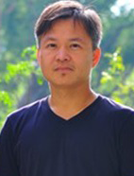2021/05/06(Thu) 10:30 -12:00 五樓第一會議室 5F, 1st Meeting Room

Title
Mechancially Controllable Functionalities
Speaker
朱英豪 特聘教授 (國立陽明交通大學材料科學與工程學系) Distinguished Professor Ying-Hao Eddie Chu (Department of Materials, Science & Engineering, NYCU)Abstract
In solids, the periodic configuration of atoms is a consequence of energy minimization. The involved atoms and corresponding arrangements determine the properties of materials. Therefore, dynamically tuning the periodicity of atom arrangements named strain application is a fundamental approach to tune the functionalities of materials. According to the literatures, several approaches have been developed to impose strain onto materials. As early in 1970s, scientists have applied a hydrostatic pressure to materials, delivering a direct evidence of lattice alteration by external force. Moreover, external stimuli such as magnetic field, electric field, and light illumination can also induce a change of lattice attributed to the effects of magnetostriction, electrostriction and photostriction. However, currently there is no applicable method to apply mechanical force to materials since the application of hydrostatic pressure cannot be implemented in a device form. This concept in principle can be realized by mechanical bending because it is the simplest way to cause a material deformation. Such a method requires the mechanical flexibility of materials. Besides, to ensure the strain can be imposed without the absorption by defect formation, high quality materials such as single crystals or epitaxial films are preferred. However, most single crystals cannot be bent mechanically. Thus, there are two critical requirements for the desired architecture: high mechanical flexibility and the ability of epitaxial growth. In search of suitable substrate to build up heterostructures, two dimensional layered oxide, muscovite, is an eligible candidate due to the fact it possesses superior mechanical flexibility with high melting point (~1260-1290℃). In the past researches, the capability of epitaxial growth on muscovite via van der Waals epitaxy has been demonstrated on various kinds of materials with excellent mechanical flexibility. In order to acquire the modulation of material properties, functional materials with large strain susceptibility is needed. In this talk, I will show you the strong and reversible modulation of functionalities, such as resistivity, dielectric constant and ferroelectric polarization, and magnetization based on oxide heteroepitaxies on muscovite by mechanical bending. Such results deliver a new playground for mechanically controllable devices for various kinds of applications.
CV
Language
演講語言 (Language): in English